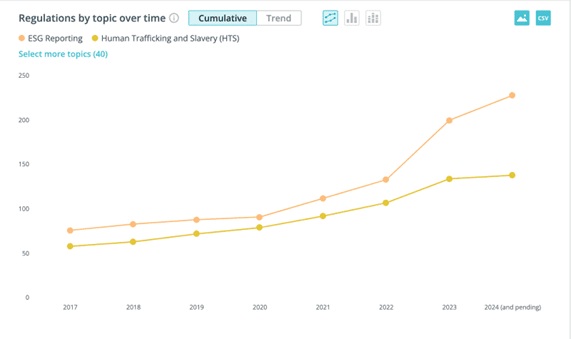
Looking Ahead To 2024’s ESG Developments in the EU

OUR “IN PRACTICE SERIES” IS BROUGHT TO YOU IN PARTNERSHIP WITH KENNEDYS LAW LLP
TO HELP ENSURE YOU HAVE ACCESS TO PRACTICAL INSIGHTS BACKED BY OUR COMPREHENSIVE, IN-DEPTH REGULATORY EXPERTISE.
AUTHORED BY: SARAH-JANE DOBSON, PARTNER, Louise Forrest, consultant, and Tegan Johnson, Solicitor Apprentice, KENNEDYS LAW LLP
This blog was originally posted on 7th May, 2024. Further regulatory developments may have occurred after publication. To keep up-to-date with the latest compliance news, sign up to our newsletter.
Over the past few years, awareness has grown in respect of environmental issues, as well as the linked social and governance elements of the popular ESG term. What was once a slow drive towards change has become a co-ordinated, consistent approach to encourage improvement and legislate to achieve Net Zero. In 2023, it was increasingly obvious how key this is to the agenda of policymakers in the EU and globally. In 2024, we expect this to continue, and we are expecting some significant developments.
This does mean we have a lot of legislative items across the ESG spectrum at various stages of drafting and completion. A number of items relating to products law in the EU are outlined below, and they display an increasingly complex and growing landscape of regulation for those involved in the manufacture and distribution of products to understand and comply with.
Broadly speaking, these stem from the 2019 EU Green Deal, a general policy which aimed to reduce greenhouse gas emissions and resource waste while maintaining economic growth across the Union. This was supported by the European Climate Law, which wrote into law the goal of reaching carbon neutrality by 2050. Another important linked measure was the 2020 Circular Economy Plan, which implemented initiatives across product life cycles: from design to processes to waste and reuse of resources.
The measures ongoing in the EU (both as outlined below and generally) cover each strand of the ESG theme:
- Environment: to achieve carbon neutrality by 2050, the EU will need to take huge steps, and products of all sectors and across their entire life cycle will necessarily be affected. Legislation currently discussed considers items as widely spread as deforestation when creating raw materials to repair existing products to advertising sustainability claims.
- Social: forced labour seems to be the key focus for the social strand, with modern day slavery and child labour being highlighted as a societal issue not only on distant shores but across the globe. Measures to clamp down on forced labour will affect millions of people and are an obvious priority, not only for EU based companies but companies active worldwide and their supply chains as well.
- Governance: a number of measures including the Corporate Due Diligence Directive would make companies undertake due diligence and monitoring of their impacts on the first two strands, with greater transparency allowing for better overarching monitoring.
As the EU Parliament’s elections scheduled over the summer draw near, we are expecting to see some big changes in advance of the elections for polling boosts. After this, there is more uncertainty, but nobody is expecting these priorities to be turned on their head: carbon taxes, carbon capture, biodiversity and human wellbeing are all key areas for governments across the world and the EU.
The Legal Framework
Some of the key elements of the existing and upcoming ESG legal framework include:
| Eco-design | Arguably the most talked about measure is the proposal for a regulation which would establish a framework setting ecodesign requirements for sustainable products. Current ecodesign requirements consider only specific energy-related products, but the new proposal would widen this scope to include almost all physical products and components. The new proposal also expands the requirements themselves, to include product durability, reliability, upgradeability, repairability and resource efficiency. In a striking new measure, it would introduce the concept of a digital product passport – to include sustainability information for regulated products. In December 2023, provisional agreement over the regulation was reached, and formal approval is expected in the first quarter of this year. |
| Right to repair | The proposed right to repair directive aims to encourage repair as opposed to replacement of consumer products by making such repairs more accessible and cost effective – whether or not the company guarantee is ongoing. Once a product has been purchased, the directive would create a right to repair even after the guarantee. Sellers will be required to repair products within the guarantee period (unless this is more costly) and, after its expiry, to give consumers more rights and tools to allow for repairs. Provisional agreement was reached on this draft measure on 1 February and it is now awaiting formal approval. |
| Green claims | While consumers become more aware of the environmental impacts that companies and products have, companies have increasingly begun to use this awareness in advertising their products – claims that products are “green”, “eco-friendly”, or “more sustainable than ever before”. The EU has prioritised the accuracy of these claims, noting the consumer impacts of vague or even false statements, and in March 2023 published a proposal for a Directive on such claims: the Green Claims Directive. The directive sets out standards for companies to abide by when using these claims. In particular, this includes minimum criteria for substantiation of claims with evidence, specific rules for comparative claims (i.e. new and improved products), verification of claims by third parties and proper labelling. In March the European Parliament adopted its position on first reading of the proposal. |
| Corporate due diligence | In mid-December 2023, political agreement was reached on the Corporate Sustainability Due Diligence Directive (CSDD). The Directive places an obligation on companies to carry out specific mandatory due diligence considering the company’s (and its wider supply chain’s) impact on both environmental and social elements of ESG. Where risks or negative impacts to human rights and/or the environment are identified, they should be recorded to set standards, and where possible mitigated or entirely prevented. On 15 March 2024, the European Union Council voted to adopt the CSDD, which will need to be approved by the European Parliament before transposition across the EU. |
| Deforestation | In June 2023 a regulation on tackling deforestation and promoting ‘deforestation-free’ products took effect. Certain products (beef, cocoa, coffee, palm oil, wood and rubber) and products derived from them (chocolate, leather, furniture, tyres and so on) require great land use, and the requirement for land can lead to mass deforestation – which itself causes greenhouse gas emissions and biodiversity loss. Under the new law, any business placing products utilising these key commodities on the EU market will be required to undertake due diligence, including on the initial supply of products to ensure the land used was not subject to deforestation. The regulation provides for an 18-month transition period, so by the end of the year, businesses will be expected to have measures in place. |
| Forced labour | In September 2022, the Commission proposed a regulation to prohibit the products made using forced labour from being placed on the EU market – in recognition of the millions globally who are affected, across all continents and affecting products in all categories. Manufacturers would be required to ensure forced labour is not utilised anywhere in their supply chains for their products and components, regardless of sector. The proposal is currently going through the ordinary legislative process, with the European Union Council and European Parliament reaching provisional agreement on the regulation on 5 March 2024. |
The Regulatory Trend

Checklist To Improve Compliance
- Sustainability regimes are complex, with some being product specific and others acting as umbrellas across product types. It can be difficult to understand at first glance which measures may apply to a given business or product, but this is an important starting point.
- Many measures extend to include; ensuring a supply chain is unaffected by a set issue – not just that a business avoids engaging in, for example, deforestation, but their whole supply chain must too. Early engagement with other involved parties will be of great benefit and can help businesses understand what they may need to change, as well as ensuring accountability is firmly embedded.
- As well as the potentially extensive legal penalties, non-compliance can be punished by consumers. We’re seeing a “brown tax” on businesses who are not proactive in their sustainability approaches – as opposed to the “green bonus” enjoyed by forward thinking companies. Creating sustainable practices and codes of conduct that align with your business model while prioritising ESG development can assist.
- Where products can be designed from the start with sustainability in mind, this can make compliance easier. Considering the raw materials, energy consumption throughout its life cycle, longevity and support for a product after purchase, and even recyclability can all go a long way.
- While product passports may become a legal requirement, early adoption can boost consumer uptake as well as assisting with compliance for other measures. Keeping information up to date will be key, but it can help businesses to utilise new measures – not only for strict compliance but also to inform and assist consumers.
- Once internal actions and supply chains have been considered, make sure to measure performance and re-check on a periodic basis. This can help identify issues before they arise, as well as to understand performance and improvements being made.
Stay Compliant With Global Regulations
Catch up with our previous editions of our In Practice Series –
- Tougher EU Rules On Green Claims Coming Down The Tracks – What To Expect
- How To Avoid “Greenwashing”
- How To Be An ESG-Conscious Product Manufacturer
- The Future Medical Device Regulations Within The UK
- Human And Fundamental Rights Violations In Supply Chains – What Can Responsible Businesses Do?
- Reform Of UK Product Safety Regime – What Can Businesses Expect & How To Prepare
- The Product Security And Telecommunications Act (PSTI) – What You Need To Know
- The EU’s AI Act And Product Safety
Stay Updated on Regulatory Changes
Join 40,000 global compliance professionals and get free webinars, whitepapers and regulatory blogs straight to your inbox every month


